
Scholar aims to give back to her Native Hawaiian community after earning doctorate in New Mexico
Listen to the Story
Click here for audio transcript
Leilani Jean Kauluaoao De Lude:
Whenever somebody asks me, what does home mean to you? I think about the ocean. The ocean and the beach are places where my family always meets up or has like a family reunion with a bunch of tents on the beach, or has a funeral in which we spread the ashes in the ocean and spread lei and flowers.
Aloha. My name is Leilani Jean Kauluaoao De Lude. I’m from Mākaha, Oʻahu.
I am a second year Ph.D. student in the Poli Sci department at the University of New Mexico.
I study a lot of Indigenous politics and land back movements.
My dad and his siblings were always active in Hawaiian politics. We would go to like protests surrounding Hawaiian sovereignty.
I think growing up in Hawaiʻi has shaped my identity tremendously, especially as I get older. Not only as I realize, like with the Census even, in 2020, now that we know that there’s more Hawaiians living off the Islands than on the Islands, that it’s such a privilege for me to have been raised in Hawaiʻi and been raised in the culture.
The Hawaiian diaspora is, it’s interesting because my family has been, again, lucky enough to be raised in Hawaiʻi. But now, they, my siblings all went to college in the mainland or in the States.
Just the cost of living in Hawaiʻi is a very big reason why Hawaiians might be leaving. There’s also this brain drain in which there’s just not enough jobs or jobs available at that time for Native Hawaiians… You know, it’s a lot of pushing off more than willingfully leaving.
Being in New Mexico and talking to other Native populations has also shown me the importance and that other Indigenous and Native populations experience this same feeling of loss or emptiness, as like the very strong words to use, but of just being out of place when you’re away from home.
I think Hawaiʻi also is just such a rich place and the people are so different. And I see that every day in New Mexico, especially when it comes to my identity. You know, I’m like, very white-presenting, mixed Hawaiian.
And even when people are like, ʻOh, you’re blonde and you have blue eyes, like, how can you be Hawaiian?’ I’m always like, oh, I’m Hawaiian. Don’t worry about it. I think having been in Hawaiʻi for so long helped me solidify that. So that when I face that in New Mexico or in other places…that I keep strong to that. That I am not only Hawaiian, but I’m a Hawaiian who was raised in Hawaiʻi, in Mākaha, where all my other family was raised.
We’re past blood quantum. It’s not about that anymore. It’s about who are you? Are you Hawaiian? Great. Welcome to the family.
We’re all Hawaiian and whatever stage we’re at, that’s where we’re at. And that’s how we connect to the identity. And that diversity is something that we can celebrate.
After I finish my Ph.D. program, fingers crossed. I really hope to be able to get a job back in Hawaiʻi. Of course, a professor job is the dream job.
If there’s one thing my dad has always told me it’s, “Go ahead, go learn whatever you want, everywhere else, but you have to bring it back to Hawaiʻi. You have to come home.” I always knew I was going to come back home to Hawaiʻi. But now the question is just, oh, when can that happen? And what does that look like for me?
What is the meaning of
home?
Molly Mamaril speaks with Leilani De Lude, a political science doctoral student at the University of New Mexico in Albuquerque. Her studies are focused on Native Hawaiian identity, kinship with land and sovereignty. Though living away from Hawaiʻi is difficult, De Lude maintains her connection to home through her family and memories of her childhood in Mākaha, Oʻahu. Despite the high cost of living, De Lude’s dream is to return to the Islands as a professor to serve her Native Hawaiian community.
“If there’s one thing my dad has always told me, it’s ‘Go ahead, go learn whatever you want everywhere else, but you have to bring it back to Hawaiʻi.’ I always knew I was going to come back home.”
Leilani Jean Kauluaoao De Lude enjoys reflecting on memories of her childhood in Mākaha, on the island of O’ahu. Now a second-year political science Ph.D. student at the University of New Mexico in Albuquerque, the 25-year-old tries to orient herself in her new landscape.
“As somebody who can’t situate herself with north, south, east, west –– I’m always looking for the ocean and the mountains,” she said.
To De Lude, home is the ocean and the land. She recalls tents on the beach during family reunions and honoring loved ones who passed away by spreading their ashes, flowers and lei in the water.
Growing up, her parents played key roles in providing their children with a culturally grounded upbringing. Her mom is white and her dad is Hawaiian. While her mom isn’t originally from the culture, she embraced raising her kids Hawaiian.
However, throughout her youth, people questioned De Lude’s Hawaiianness.
“When people are like, oh, you’re blonde and you have blue eyes, how can you be Hawaiian?” De Lude recounts, “I’m always like, oh, I’m Hawaiian. Don’t worry about it. Having been in Hawaiʻi for so long helped me solidify that I am not only Hawaiian, but I’m a Hawaiian who was raised in Mākaha, where all my other family was raised.”
She is especially grateful for her mom’s support when she and her siblings would cry after being treated as less than because they were more “white presenting.” She experienced firsthand the dynamic of a mixed household and the challenges that come with feeling the need to prove that you belong.
“We’re past blood quantum –– we’re all Hawaiian, whatever stage we’re at,” said De Lude. “That’s how we connect to identity and that diversity is something we celebrate.”
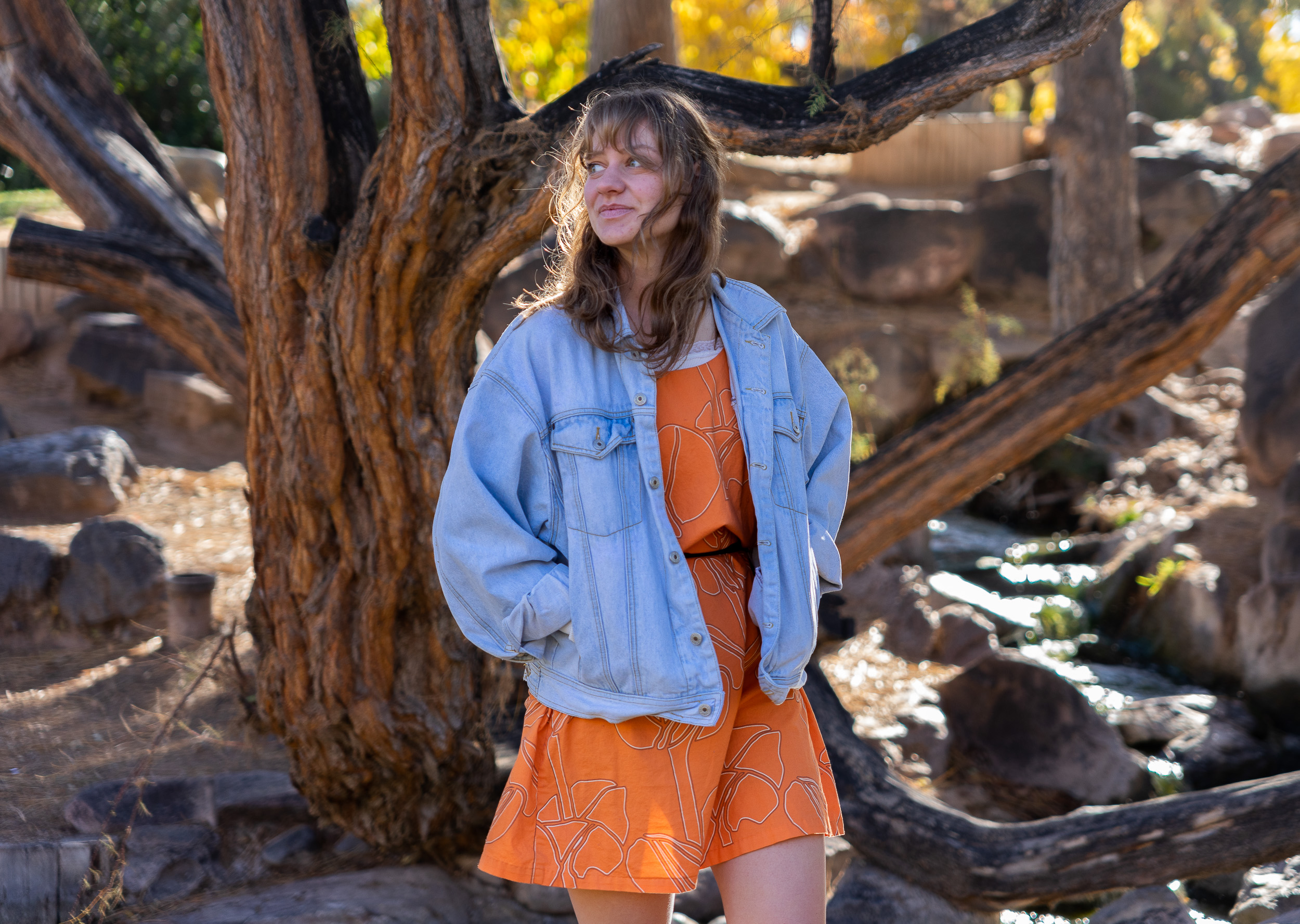
“There is no place like home, especially when it comes to Hawai’i. And the best version of [myself] has always been in Hawai’i,” De Lude reflects.
MOLLY MAMARIL / NEXTGENRADIO
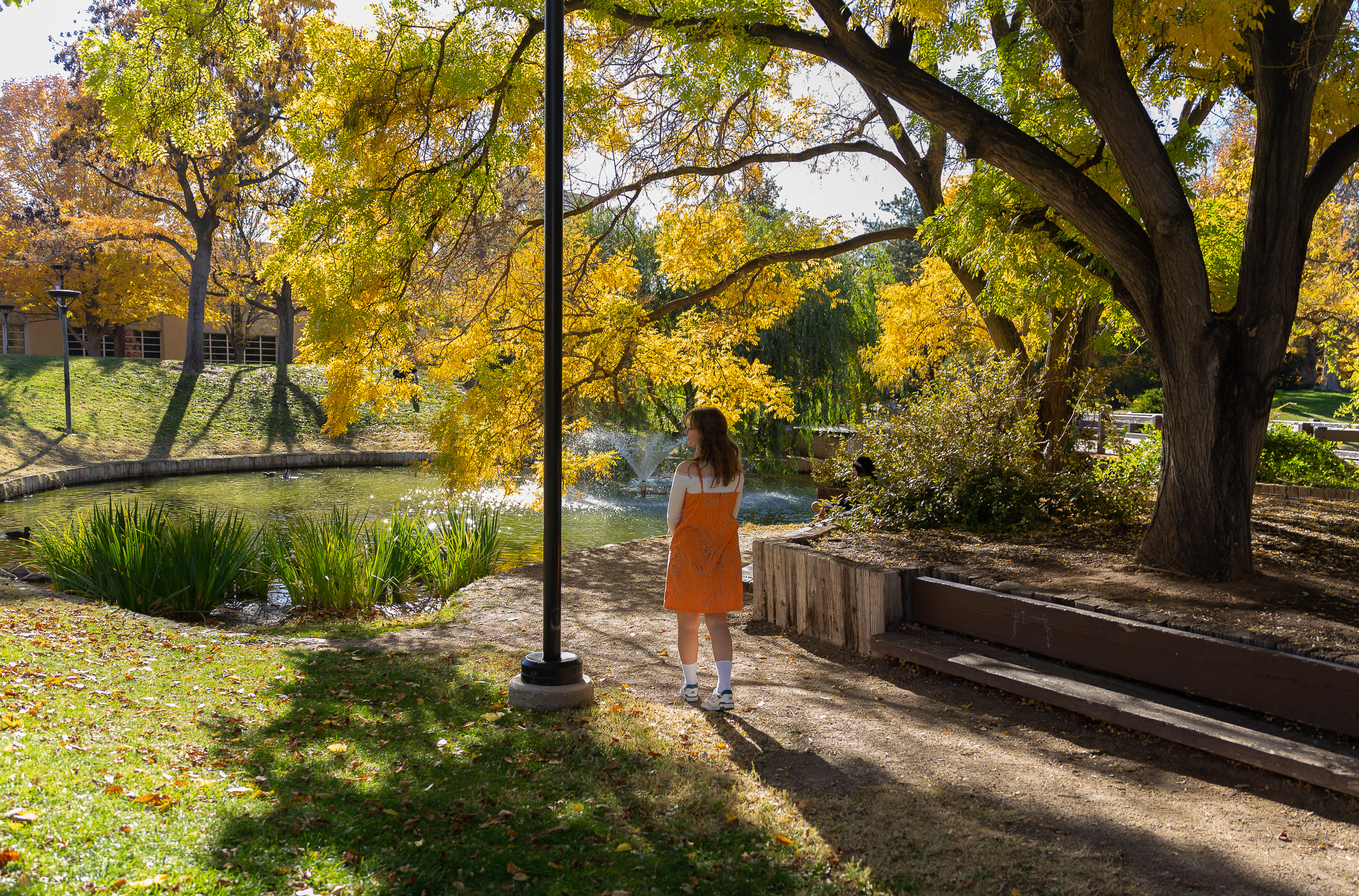
To connect with nature and for quiet study, De Lude visits the duck pond at the University of New Mexico in Albuquerque on Monday, Nov. 13, 2023. “As somebody who can’t situate herself with north, south, east, west –– I’m always looking for the ocean and the mountains,” De Lude says.
MOLLY MAMARIL / NEXTGENRADIO
Land stewardship is second-nature for many kamaʻāina (Native born, children of the land), such as De Lude, who take on extra responsibility to preserve the identity of their home.
“I grew up in a politically active family,” she said. “My dad and his siblings were always active in Hawaiian politics. We would go to protests surrounding Hawaiian sovereignty. We would stick up for land. We still talk about Hawaiian politics at the dinner table.”
In her day-to-day life, De Lude commits herself to pursuing community-based research on Native Hawaiian identity, connection to land and sovereignty. Her interest in data began at Hawaiʻi Pacific University when she was a student on the Native Hawaiian Survey research team.
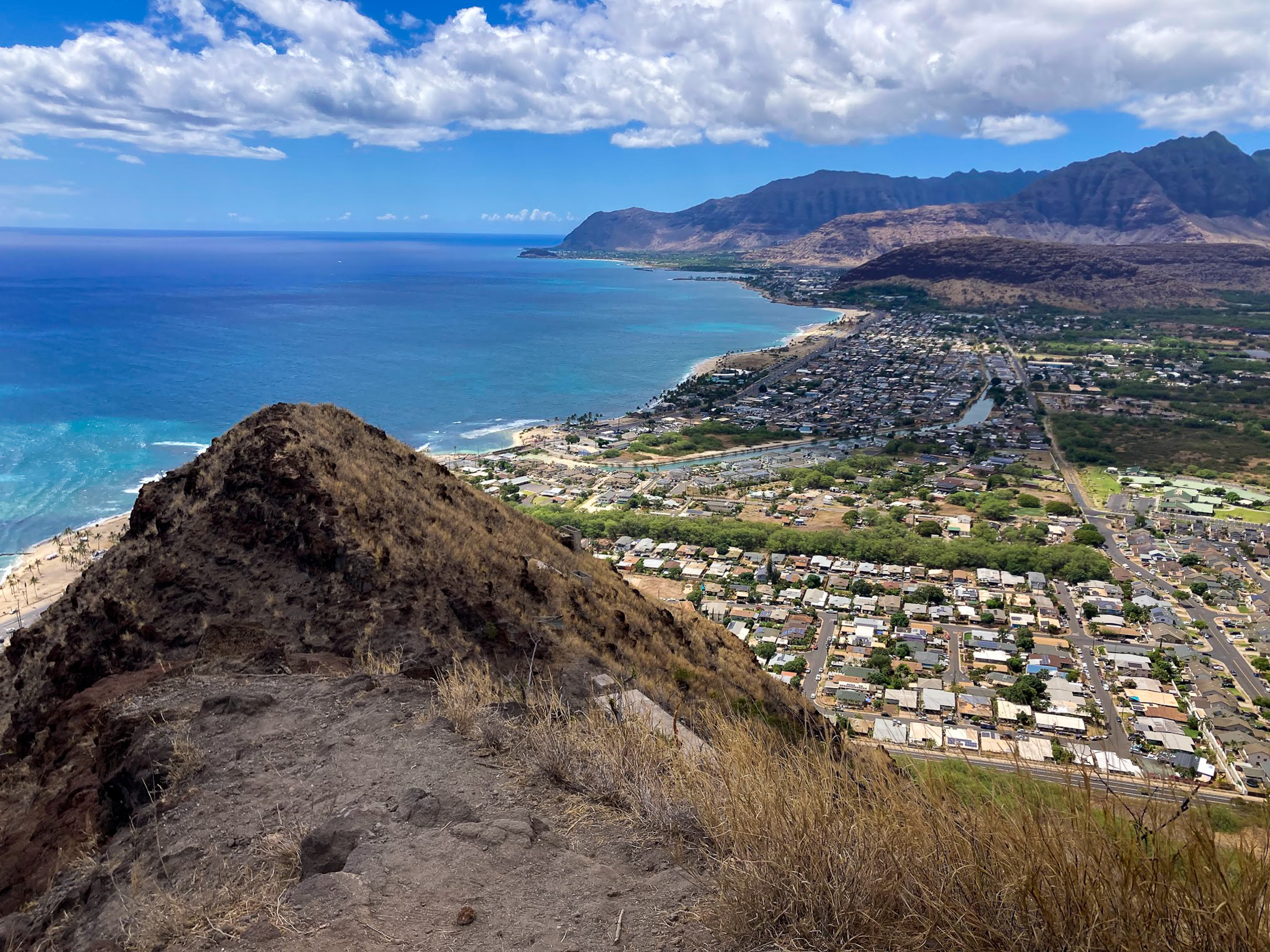
The west side of the island of Oʻahu is dotted with beaches and the Waiʻanae mountain range. Mākaha, Leilani De Lude’s hometown, sits in the distance. “Home to me looks like Mākaha. There are the tide pools near the reefs with Hawaiian sea salt, little hermit crabs, wana (sea urchins) and seaweed,” says De Lude, a Native Hawaiian pursuing a Ph.D. at the University of New Mexico in Albuquerque.
MOLLY MAMARIL / NEXTGENRADIO
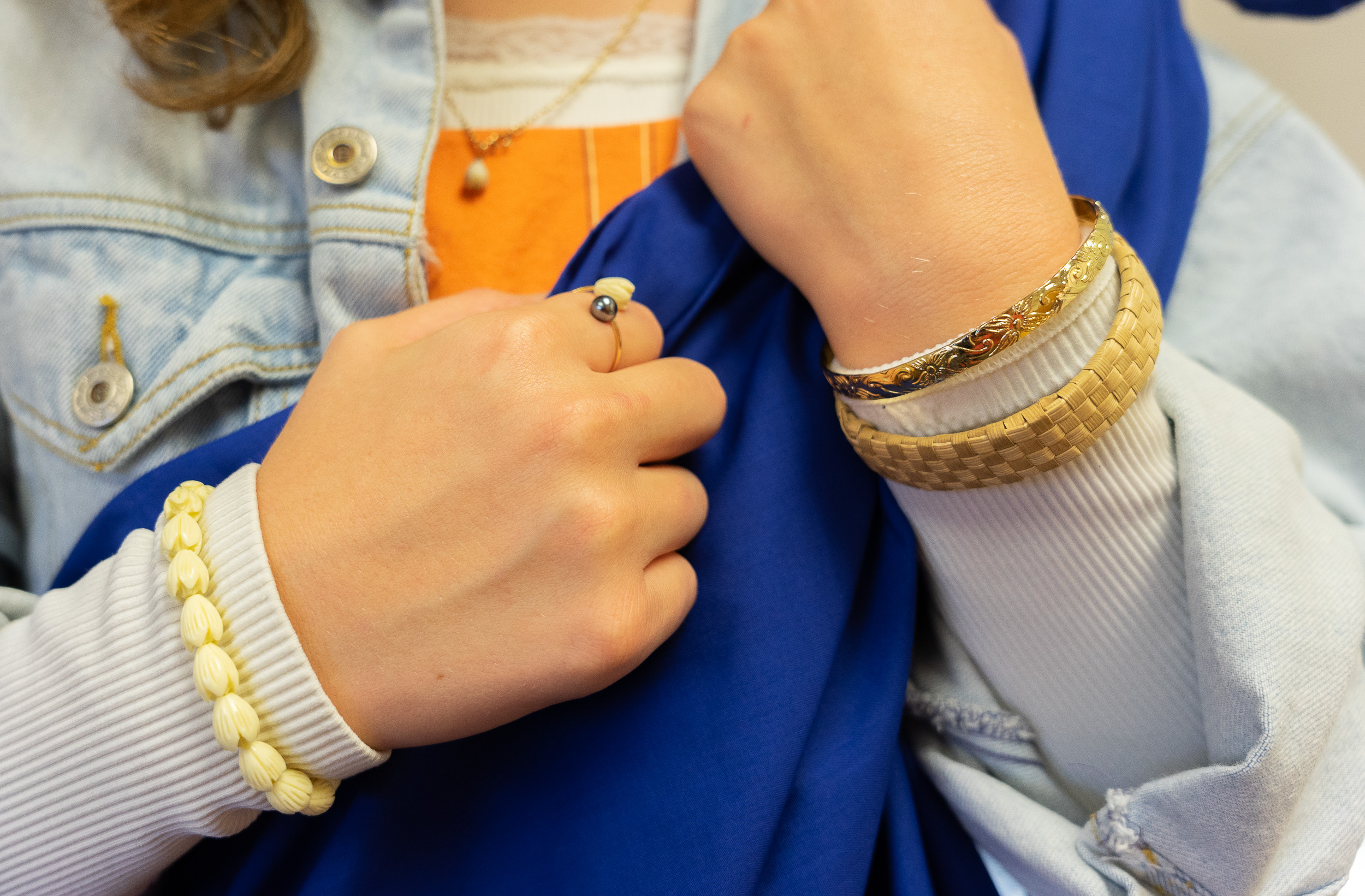
De Lude wears everyday reminders of Hawaiʻi as jewelry, including a carved pīkake flower bracelet, a shell necklace, a shell and pearl ring, a golden Hawaiian heirloom bangle and a woven lauhala bracelet.
MOLLY MAMARIL / NEXTGENRADIO

EMILY WHANG / NEXTGENRADIO
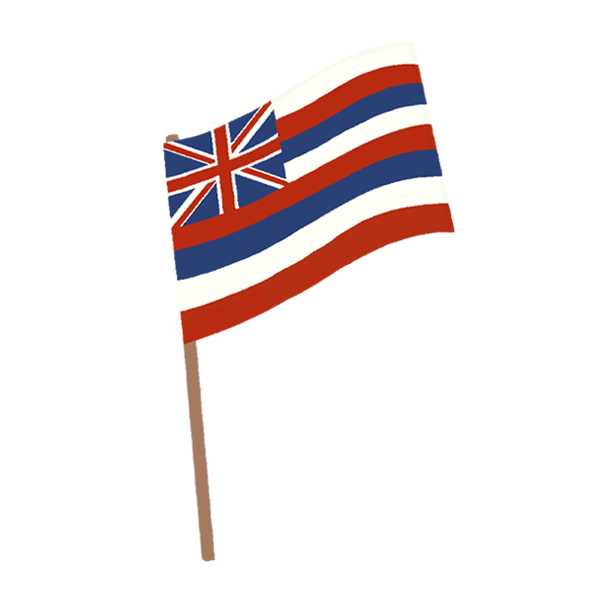
EMILY WHANG / NEXTGENRADIO
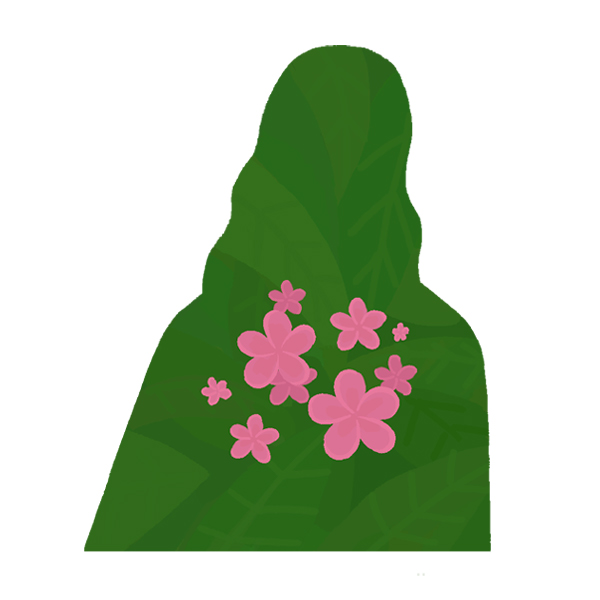
EMILY WHANG / NEXTGENRADIO
We’re past blood quantum –– we’re all Hawaiian, whatever stage we’re at. That’s how we connect to identity and that diversity is something we celebrate.
A facet that plays into her future in research is the growing Hawaiian diaspora. According to the 2020 U.S. Census, the majority of Hawaiians now live outside of Hawaiʻi. Two of De Lude’s siblings now live in the continental U.S. and they’ve shared their struggles with identity — being in a new environment where nobody understands what it means to be Hawaiian.
The high cost of living, limited quality jobs and expensive housing are key elements in many residents’ decisions to move away from home. There are many steps that people go through before making the decision to leave, including living with family in multigenerational homes.
“There’s also this brain drain in which there’s just not enough jobs,” said De Lude. “It’s a lot of pushing off more than willingful leaving.”
During the Maui wildfires in August, De Lude was home on summer break. From the neighboring island of Oʻahu, she was heartbroken about the devastation that the Lāhaina community was experiencing.
“I worried, especially living on that dry side and seeing the Waiʻanae mountain range go up in flames for the past couple of summers,” said De Lude. “I knew that it was a real threat not only to Maui, but to my family on the west side [of Oʻahu].”
When she returned to Albuquerque for the fall semester, she found comfort in friendships with other Indigenous students and professors who could empathize with the loss of land. A local hula hālau (school) hosted a fundraiser to support wildfire victims and she found it to be a new way of connecting with Hawaiians in Albuquerque.
“The fires really pushed the community to come together,” De Lude said. “Being in New Mexico has shown me that other native populations experience this same feeling of loss or emptiness … just being out of place when you’re away from home.”
Despite the challenges of living on the Islands, De Lude’s goal is to return to Hawaiʻi as a professor. She hopes to be an approachable teacher who can relate to being an Indigenous college student and ideally mentor youth to get to the same place.
“It took a village to get me here,” said De Lude. “And I hope that it shows other Native Hawaiians they can also pursue a Ph.D. in whatever field that they want.”
Moving forward, she intends to contribute to the body of research that gives Hawaiians a greater voice in decision-making. She wants to show a culturally grounded way of doing research that not only has community support, but also accounts for the deeper political elements at play when researching with, and for, Native Hawaiians.
“There is no place like home, especially when it comes to Hawaiʻi,” said De Lude. “And the best version of [myself] has always been in Hawaiʻi.”
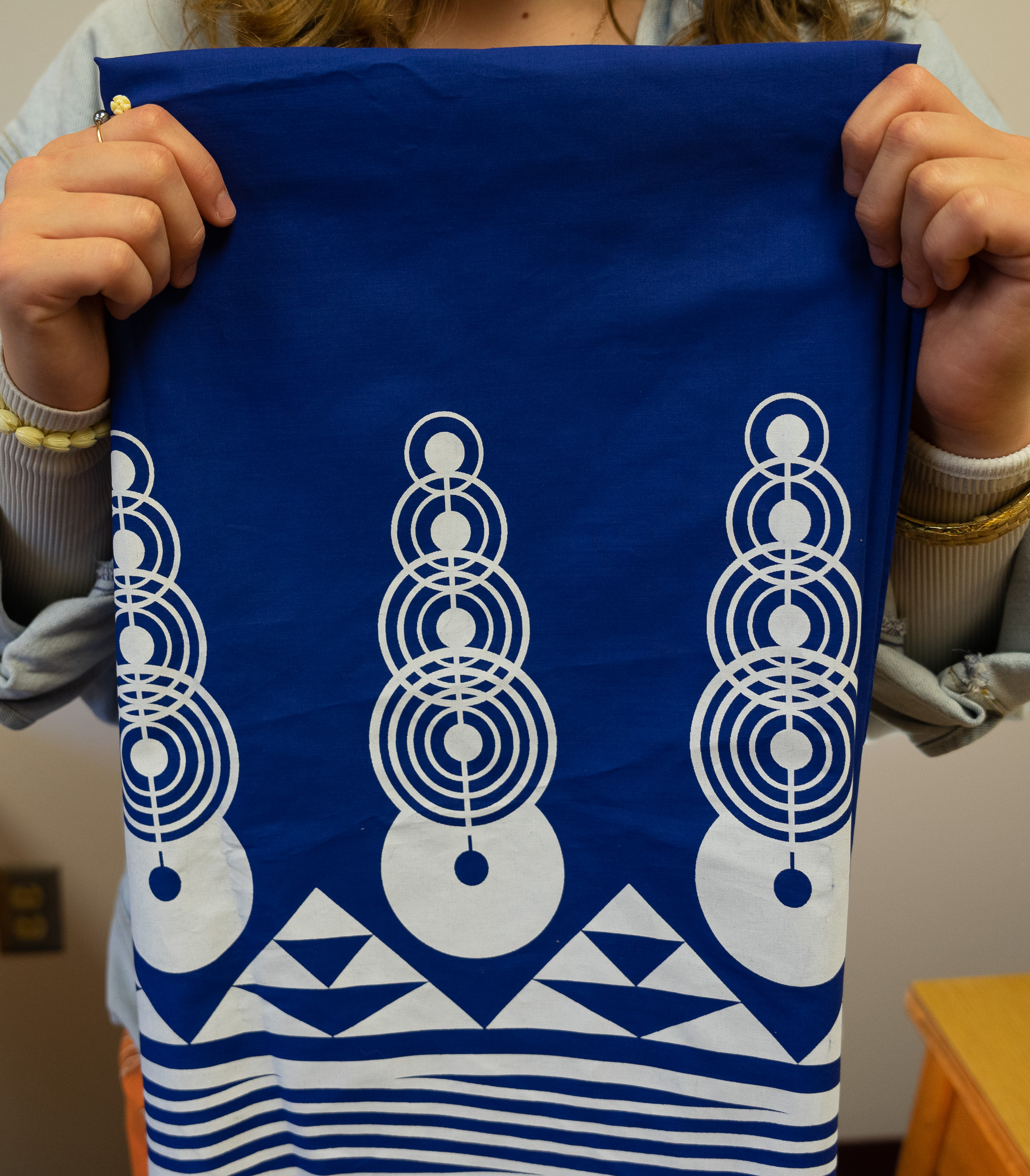
De Lude brought her blue and white kīhei, a traditional Hawaiian garment, to New Mexico as a reminder of home. This kīhei is a gift to her and fellow classmates upon their high school graduation from Kamehameha Schools – Kapālama in Honolulu.
MOLLY MAMARIL / NEXTGENRADIO
